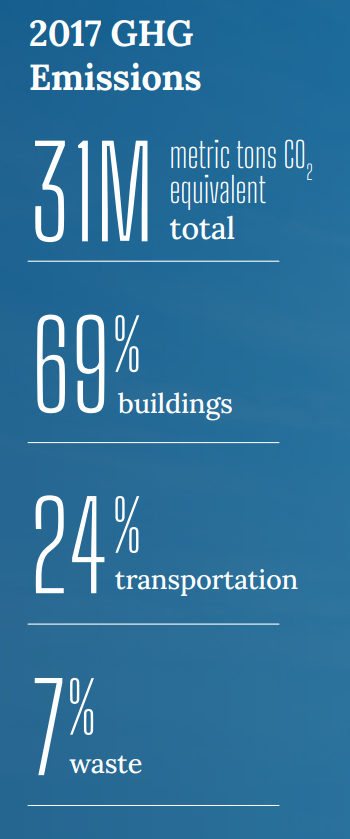Electrify Chicago
An independent tool for viewing City of Chicago building data
According to the
2022 Chicago Climate Action Plan,
69% of Chicago's emissions come from buildings, making
building emissions our biggest challenge and our biggest opportunity as a city
to tackle climate change. At Electrify Chicago, we showcase building performance using
publicly available data supplemented by community-submitted photographs and building
owners.
Start by looking at Chicago's buildings with the highest greenhouse gas intensity i.e. emissions per square foot. Large, efficient, buildings can perform much better than very inefficient small buildings on this metric.
New Article
📰 $30 Million In Missed Fines
The City Of Chicago failed to collect $30 million in potential fines from the building benchmarking ordinance, reducing transparency and accountability.
Legislative update! 🎉
As of late January 2024, legislation is being introduced to require new use more efficient forms of water and space heating, via the Clean And Affordable Buildings Ordinance (CABO), which will reduce the number of highly polluting and inefficient buildings that end up on this site.
If you're in Chicago,
write to your alderman to support the CABO!
Chicago Buildings by Greenhouse Gas Intensity
Note: Data includes large Chicago buildings with data from 2022, unless explicitly stated otherwise.
Note: This data only includes buildings whose emissions are reported
under the
Chicago Energy Benchmarking Ordinance. According to the City “As of 2016,
this list includes all commercial, institutional, and residential buildings larger than
50,000 square feet.” This dataset is also then filtered to only buildings with
reported emissions > 1,000 metric tons CO2 equivalent.
The latest year of data is from 2022, but we update the site regularly when new data is available, and some buildings may have failed to report that year, and only have older data available.
| Property Name / address | Primary Property Type |
Greenhouse Gas Intensity (kg CO2 eq./sqft) |
Total Greenhouse Emissions (metric tons CO2 eq.) |
|---|---|---|---|
|
2101 S WABASH AVE
2101 S WABASH AVE
| Multifamily Housing | 9.6 kg/sqft
Highest 15%
| 306 tons
Lowest 9%
|
|
East Park Apartments
3300 W MAYPOLE AVE
| Multifamily Housing | 9.6 kg/sqft
Highest 15%
| 603 tons
Lowest 33%
|
|
Park West Condominium
444 W FULLERTON PKWY
| Multifamily Housing | 9.6 kg/sqft
Highest 15%
| 1,852 tons
Highest 25%
|
|
de Nobili Hall-ID#254169
🕰️
(Loyola)
6350 N Kenmore Ave
| Residence Hall/Dormitory | 9.5 kg/sqft | 692 tons |
|
Maguire Hall-ID#254163
🕰️
(Loyola)
1 11 E Pearson Ave
| Office | 9.5 kg/sqft | 525 tons |
|
Presence Center for Advanced Care
331 W Surf St
| Medical Office | 9.5 kg/sqft
Highest 16%
| 3,283 tons
Highest 12%
|
|
Hearst Elementary -CPS
🕰️
(CPS)
4640 S Lamon Ave
| K-12 School | 9.5 kg/sqft | 799 tons |
|
Bass Elementary -CPS
(CPS)
6554 S May St
| K-12 School | 9.5 kg/sqft
Highest 16%
| 817 tons
Lowest 47%
|
|
Langston Hughes Es -CPS
(CPS)
226 W 104th St
| K-12 School | 9.5 kg/sqft
Highest 16%
| 951 tons
Highest 47%
|
|
New Field Primary -CPS
(CPS)
1707 W Morse Ave
| K-12 School | 9.5 kg/sqft
Highest 16%
| 810 tons
Lowest 47%
|
|
U Of Chicago Charter- Donoghue -CPS
(CPS)
707 E 37th St
| K-12 School | 9.5 kg/sqft
Highest 16%
| 710 tons
Lowest 41%
|
|
Ray Meyer Fitness and Recreation Center
(DePaul)
2235 N Sheffield Ave
| College/University | 9.5 kg/sqft
Highest 16%
| 1,117 tons
Highest 41%
|
|
7033 N KEDZIE AVE
7033 N KEDZIE AVE
| Multifamily Housing | 9.5 kg/sqft
Highest 16%
| 3,075 tons
Highest 13%
|
|
College of Education Building
(DePaul)
2247 N Halstead Ave
| College/University | 9.5 kg/sqft
Highest 16%
| 484 tons
Lowest 25%
|
|
72 E 11th St
(Columbia)
72 E 11th St
| College/University | 9.5 kg/sqft
Highest 16%
| 632 tons
Lowest 36%
|
Data Source:
Chicago Energy Benchmarking Data
